democracynow.org
Stories:

"Horrified": Seymour Hersh Reacts to Obama's Plan to Send 250 More U.S. Special Ops Troops to Syria
President Obama has announced the deployment of 250 more Special Operations troops to Syria in a move that nearly doubles the U.S. presence in the country. This comes just days after the Obama administration announced 217 more troops would be sent to Iraq to help in the fight against the self-proclaimed Islamic State. As the U.S. expands its presence in Iraq and Syria, we speak with the legendary investigative journalist Seymour Hersh, who has just published a new book titled "The Killing of Osama bin Laden." In the introduction, Hersh writes: "It’s now evident, fifteen years after the 9/11 attacks, that Obama’s foreign policy has maintained many of the core elements of the Global War on Terror initiated by his predecessor—assassinations, drone attacks, heavy reliance on special forces, covert operations and, in the case of Afghanistan, the continued use of American ground forces in combat. And, as in the years of Bush and Cheney, there has been no progress, let alone victory, in the fight against terrorism."
TRANSCRIPT
This is a rush transcript. Copy may not be in its final form.
AMY GOODMAN: We’re on a 100-city tour marking Democracy Now!'s 20th anniversary. Today, we're broadcasting from the Roundhouse, the Santa Fe, New Mexico, Legislature, here in Santa Fe.
President Obama has announced the deployment of 250 more Special Operations troops to Syria in a move that nearly doubles the U.S. presence in Syria. This comes just days after the Obama administration announced 217 more troops would be sent to Iraq to help in the fight against ISIS. Earlier today, President Obama addressed the wars in Syria and Iraq during a speech in Germany.
PRESIDENT BARACK OBAMA: Right now, the most urgent threat to our nations is ISIL. And that’s why we’re united in our determination to destroy it. And all 28 NATO allies are contributing to our coalition, whether it’s striking ISIL targets in Syria and Iraq, or supporting the air campaign or training local forces in Iraq or providing critical humanitarian aid. And we continue to make progress, pushing ISIL back from territory that it controlled.
And just as I’ve approved additional support for Iraqi forces against ISIL, I’ve decided to increase U.S. support for local forces fighting ISIL in Syria. A small number of American Special Operations forces are already on the ground in Syria, and their expertise has been critical as local forces have driven ISIL out of key areas. So, given the success, I’ve approved the deployment of up to 250 additional U.S. personnel in Syria, including special forces, to keep up this momentum. They’re not going to be leading the fight on the ground, but they will be essential in providing the training and assisting local forces as they continue to drive ISIL back.
AMY GOODMAN: As the U.S. expands its presence in Iraq and Syria, we turn to the legendary investigative journalist Seymour Hersh, who won the Pulitzer Prize for exposing the 1968 My Lai Massacre in Vietnam, when U.S. forces killed hundreds of civilians. In 2004, Sy Hersh broke the Abu Ghraib prisoner abuse scandal. He has just published a new book titled The Killing of Osama bin Laden. In the introduction, Hersh writes, quote, "It’s now evident, fifteen years after the 9/11 attacks, that Obama’s foreign policy has maintained many of the core elements of the Global War on Terror initiated by his predecessor—assassinations, drone attacks, heavy reliance on special forces, covert operations and, in the case of Afghanistan, the continued use of American ground forces in combat. And, as in the years of Bush and Cheney, there has been no progress, let alone victory, in the fight against terrorism."
Seymour Hersh, it’s great to have you back on Democracy Now! Congratulations on your book. Why don’t we start by talking about what President Obama announced in his speech in Germany today, just hours before this broadcast: increased troop presence in Syria. What does it mean?
SEYMOUR HERSH: First, happy anniversary. Glad you’re still around, kiddo.
AMY GOODMAN: Thank you.
SEYMOUR HERSH: Well, one of the words he doesn’t mention is Russia. Look, I can’t begin to tell you what’s in his mind. It’s a little amazing at this stage he’s putting more forces in, but that’s—you know, that’s his prerogative, I guess, as president. Always makes good news. Nobody ever—nobody seems in this country ever to object too much when we put more people on the ground.
But the real winner in the last year or so of the war there has been the Russians. And the Russians—the bombing was much more effective. If you remember, the president had said publicly, when Putin decided to put his air force hard at work there, he said it would be a quagmire, they wouldn’t be able to get out, it’s going to be, you know, schadenfreude—it would be like what happened to us in Afghanistan, and is happening to us, and certainly did happen to us in Vietnam. But they did it. They came in, and they did very well.
I will tell you right now, Russian special forces are in the fight against ISIS with the Syrian army, with Hezbollah, with the Iranian army, the Quds Force. And the Russians have done an awful lot to improve the Syrian army in the past year—retrained them, reoutfitted them, etc., etc., etc. It’s a much better army since the Russians came in. The fighting in Palmyra that the Syrian army and the Russian special forces did was much bloodier. ISIS fought to the death. It was a terrible toll on everybody, but it was a victory for the Syrian army. We know all these things. The Syrian army is much better. It’s probably going to—probably—we don’t know. I don’t know. Nobody knows. It will probably take Raqqa, the former capital city, if you will, ad hoc capital city of ISIS. ISIS is on the run, particularly in Syria, not necessarily in Iraq.
And I just don’t understand what the president is doing, why he wants to engage more. But, you know, it’s not my call. I would also—I’ve been told there are many more forces in Iraq than we’re publicly announcing, including even some elements of one of our airborne divisions. What the hell? As usual, we don’t really know what the game plan is. I do not understand why he’s decided to jump into a war that was being run by—it’s being won right now by the Syrian army and its allies, including Russia. I just—I can just speculate that our anti-Putin, anti-Russian instinct in America continues apace. That’s all.
AMY GOODMAN: In your introduction to your new book, The Killing of Osama bin Laden, you write, "In a review of my interviews about Obama’s early decision to raise the ante in Afghanistan, one fact stood out: Obama’s faith in the world of special operations and in Stanley McChrystal, the commander of US forces in Afghanistan who worked closely with Dick Cheney from 2003 to 2008 as director of [JSOC] the Joint Special Operations Command." Seymour Hersh, can you elaborate on this?
SEYMOUR HERSH: Well, it’s amazing. Look, you win the presidency—hope and peace, or whatever it was—and you discover, because of—you know, you don’t have the power you might dream you would have. You can’t get a lot of things done, because you’ve got a very hostile Congress. And so—and presidents, inevitably, in frustration—look, I’ve been in this town since the '60s. There's nothing more wonderful for a president—you can feel more like a president by taking a walk with somebody from the Special Operations community or, earlier, the CIA in the Rose Garden, and getting rid of somebody you don’t like, whether you’re—in the case of—what we do now is we do targeted assassinations. Earlier, I think we just moved them out of office or did operations, you know, political operations. But now it’s really just, you know, we hit people. You know, there’s a weekly meeting in which they go through names of people to target, assassinate, including, in some cases, an American, without any due process. It’s been a wonderful movement. I don’t mean to be too sarcastic about it, but what—you know, this guy ended up in the same place in far too many times, as you read and as I wrote, as Bush and Cheney were.
AMY GOODMAN: Can you explain what these Special Ops forces are doing, both in Iraq and Syria?
SEYMOUR HERSH: I really don’t know. I mean, I know what I’m told, but I just don’t know what the truth is. Clearly, they’re going to be engaged more. They’re helping to plan operations. But I—we’re great at—we do a lot of dirty tricks in the world. You know, we were inside Iran in the first decade of this year, when the—before the Iranians began to talk seriously about getting rid of their nuclear weapons, that don’t exist, that never did exist. We were doing operations inside the Iranian—the borders, and also we even went inside Tehran with surrogates. I mean, yes, we went inside Tehran. We did monitoring for nuclear activity, etc., etc. So we’ve been deeply involved in that world in covert operations. And how much first-hand stuff, I don’t really have. I haven’t actually talked to somebody who was in Tehran, but we were doing a lot of stuff, including working with people who were doing stuff like blowing up mosques and trying to whack Iranian scientists. So I assume—one target I do know, the president has designated, is he really wants to take out Mr. Baghdadi, the head of ISIS. He’s been a high-priority assassination target for more than a year. We could be doing something like that.
But we’re certainly working with the—there’s not much you can do in Iraq, because the Iraqi army—you know, it’s the usual story: They’re going to run away. We’ve been—one of the great classic lies of America is, every year, some two-star general who’s involved with training either the Afghans or, in earlier years, the Vietnam—Vietnamese, or the Iraqi army, they come before Congress. And the two-star looks them in the eye. He’s the general in charge of training, and his promotion depends on not so much what he does, but what he says, I guess, at this point. And he tells the Congress how wonderful it’s going on, we’ve got x number of divisions ready to fight. And the congresspeople all nod. It’s a little parody that goes on. And, of course, the armies cut and run, and they’re no good, and they haven’t been. And the Iraqi army we have right now, that we’re talking so wonderfully about, is not going to go near Mosul. It’s going to be hand-to-hand fighting. If we ever do go into Mosul, we’re going to [inaudible]. So, there you are. You know, I—
AMY GOODMAN: Were you—
SEYMOUR HERSH: Yes, I’m sorry.
AMY GOODMAN: Sy, were you surprised by President Obama’s announcement today in Germany?
SEYMOUR HERSH: Horrified. I just don’t think it’s the way to go. I think it’s just putting us into—you know, as you mentioned in your introduction, we’ve been doing this war against terror, against an idea, since after 9/11, you know? And how are we doing, fellas? How’s it going there? You know, has the amount of opposition to us spread? Has the hatred of America grown more intense? We are truly a very much hated country in the Middle East. And it’s partly because of the way we fight our wars—with drone attacks and a lot of force, the prisons that we did. And Abu Ghraib was just one of many prisons. And a lot of killing goes on by us, you know.
And here’s how things have changed, for me, anyway. I’m writing the same kind of stories now about this president, very critical stories, because, you know, somebody has to hold him to—you know, at least based on what I think is as good as evidence I’ve ever had in all the stories I wrote for The New York Times in the '70s. I was there for six, seven, eight years as a sort of a hotshot there in the Washington bureau. And I wrote a lot of stories, won a lot of prizes, going after the president, going after wars, going after Kissinger, writing about illegal activities. And all of a sudden, the same stories, still anonymous—I mean, I wrote them anonymously then, and I'm writing them anonymously now. And some of the people I knew then, believe it or not, are still operating now. And it’s like, we can’t do that. It’s like the American press has moved to the right, as many elements in this country, as you see, when the Sanders case has moved to the left. It’s a much more outspoken opposition to some of the things we—the way we run campaigns. And underneath that is—of those people who support Sanders, also really dislike much more intensely the wars that are going on and the lies that are being told. But, you know, times have changed.
AMY GOODMAN: Sy Hersh, we’re going to break and then come back to this discussion. We’re speaking to Pulitzer Prize-winning journalist Seymour Hersh for the hour today. He has a new book out; it’s called The Killing of Osama bin Laden. We’re going to also talk about that, the latest in what’s known about the killing of bin Laden in Pakistan, the Saudi government’s support for him in hiding there, what the U.S. knew, as well as many other issues. This is Democracy Now! We’ll be back in a minute. ... Read More →

Seymour Hersh Weighs In on Sanders vs. Clinton: "Something Amazing Is Happening in This Country"
Legendary investigative journalist Seymour Hersh weighs in on the foreign policy positions of the 2016 presidential candidates. "For me to say who I’m going to vote for and all that … I’m not a political leader, that’s not what I’m into," Hersh says. "But I will say this: Something that’s amazing is happening in this country, and for the first time, I do think it’s going to be very hard for a lot of the people who support Sanders to support Hillary Clinton. … There’s a whole group of young people in America, across the board, all races, etc., etc., who have just had it with our system."
TRANSCRIPT
This is a rush transcript. Copy may not be in its final form.
AMY GOODMAN: This is Democracy Now!, democracynow.org, The War and Peace Report. I’m Amy Goodman. Yes, we’re on our 100-city tour marking Democracy Now!'s 20th anniversary. Today, I'll be speaking in Albuquerque, and I’ll be in Las Alamos and Santa Fe at the Lensic on Tuesday. On Wednesday, I’ll be in Flagstaff, Thursday in Phoenix and Tucson, then on Friday in Fresno, Saturday in Grass Valley. Then we’re on to Houston and New Orleans on Sunday, and beyond. Check democracynow.org.
As we turn right now back to Seymour Hersh, who has a new book out—it’s called The Killing of Osama bin Laden. Sy, I want to ask you about the presidential race. Last year at a debate in New Hampshire, Vermont Senator Bernie Sanders accused former Secretary of State Hillary Clinton of being, quote, "too much into regime change." This is what he said.
SEN. BERNIE SANDERS: But I think—and I say this with due respect—that I worry too much that Secretary Clinton is too much into regime change and a little bit too aggressive without knowing what the unintended consequences might be. Yes, we could get rid of Saddam Hussein, but that destabilized the entire region. Yes, we could get rid of Gaddafi, a terrible dictator, but that created a vacuum for ISIS. Yes, we could get rid of Assad tomorrow, but that would create another political vacuum that would benefit ISIS. So I think, yeah, regime change is easy, getting rid of dictators is easy. But before you do that, you’ve got to think about what happens the day after.
HILLARY CLINTON: Now, with all due respect, Senator, you voted for regime change with respect to Libya. You joined the Senate in voting to get rid of Gaddafi, and you asked that there be a Security Council validation of that with a resolution. All of these are very difficult issues.
AMY GOODMAN: That’s Hillary Clinton and Bernie Sanders debating in New Hampshire a while ago. So, Seymour Hersh, if you could talk about this issue and this most recent news, Charles Koch, the Republican megadonor, the oil baron, saying he could see himself actually supporting Hillary Clinton over a Republican nominee.
SEYMOUR HERSH: Well, I don’t believe that for a minute, but that’s another story. What Koch said, I think that’s just all part of pressure to get rid of Trump, who, in some ways, Trump’s pretty—I mean, who ever heard of a Republican talking about "NATO is useless"? Which, of course, pretty much a lot of people I know believe it is pretty much useless. There’s a lot of things Trump said that are pretty remarkable. He would talk to Putin, etc. It’s a pretty interesting campaign on the Republicans, how they’re sort of internally eating up themselves.
But Sanders is right, of course, about that issue. I don’t think Sanders is as sound on foreign policy as I’d love him to be, I wish him to be. I don’t think he really—he doesn’t quite understand the consequences of—he doesn’t—I don’t think he’s terribly—he just hasn’t done enough to make me comfortable. But, of course, Hillary—my favorite line about Hillary Clinton is, after Gaddafi was executed—as you know, he was killed by his own people. He was actually sodomized by swords. It was a horrible death. And she said on one show, "We came, we saw, and he died," with a laugh. And that kind of talk is sort of almost bizarre.
You know, here’s what I think about this campaign. It doesn’t—you know, it’s clear where my political thoughts are, but it’s—for me to say who I’m going to vote for and all that, I don’t think anybody—you know, I’m not a political leader. That’s not what I’m into. But I will say this: Something that’s amazing is happening in this country. And for the first time, you know, I do think it’s going to be very hard for a lot of the people who support Sanders to support Hillary Clinton. Now, times can change. There’s a lot more time to go. We’ve got months before an election and a convention, etc. But at this point, I’m at the point where—I go back to the old days. Remember, if you—you might not remember. We had a lot of talk about a third party in America, a progressive third party. Barry Commoner was one of the people who was going to run it. It went nowhere. But there’s really—it seems to me, with what’s going on now with these people, 45 and under, the enormous support they’re giving to Sanders, just we know by polling, etc.—doesn’t always show up in the—it turns out, in the election results. I mean, it certainly didn’t show up in New York. And so—but they are there. There’s a whole group of young people in America, across the board, all races, etc., etc., who have just had it with our system.
And there’s something wonderful in the—you know, look, I’ve been to Israel many times, have a lot of friends there, and there’s a lot of very good people there, but we all know it’s headed for—it’s chaos coming. And here we have a guy running for president. This is something, I guess, you know, forbidden—a forbidden statement. But he’s the first Democrat since I’ve been watching politics, 50—I’m old, older and crankier than Bernie. But anyway, it’s the first Democrat that I can remember that actually did not have to go to the Jewish community in New York to get money to run. And that’s something amazing. We may be able to actually change our policy and let the Israelis know that there’s going to have to be a settlement—not just divided, not just two countries, but a real settlement, a peace settlement, in that area.
And we’ve seen some terrific changes happening in this election, as the Democratic Party has been moving to the left, with a lot of contempt for the way the party manages itself, by the people who are pro—working—are interested in Sanders, that look at the chaos on the right. Our system is basically breaking apart right now in this election. And you can only say, "Yay! It’s great!" So, it’s inchoate. It’s not very good. It’s a little bit like the new generation of journalism we have with the tweeting and—you know, and blogging, that’s going to clearly replace the newspapers, which are dying as we sit, every day. It’s all sort of a new world coming.
AMY GOODMAN: Sy, President Obama appeared on Fox News on Sunday a few weeks ago, and he was asked what was the worst mistake of his presidency. This was his response.
PRESIDENT BARACK OBAMA: Probably failing to plan for the day after what I think was the right thing to do in intervening in Libya.
AMY GOODMAN: Can you respond, and particularly focus on Hillary as secretary of state under President Obama?
SEYMOUR HERSH: First of all, you’re just going have to take my word for it. Gaddafi was a tame cat. We got to him in the Bush-Cheney years. If you remember the history, we had a lot of bad trouble. Bush and Cheney were—I think normally would be embarrassed, should have been embarrassed, by the lies they told and the mistakes they made—let’s put it that way—about the WMDs that the—Saddam did not have an ongoing nuclear weapons system, which was known to an awful lot of people before—before we took over Baghdad and discovered nothing. At that point—I think it was a year later, in 2004—suddenly, Gaddafi, after allegedly having caught—we caught a ship full of some dual-use goods, and we stopped a ship that was going to Tripoli with it. He suddenly announced that he was giving up—unilaterally going to give up all his chemical arsenal and his WMD, his nuclear plans or options. And it was a big victory at a very much needed time by the Bush and Cheney crowd, that was a victory that showed our policy is working right. Money was involved, the CIA, covert money. A lot of stuff was going on. As you know, I’ve been doing a book about Cheney for a long time. And I can tell you that it was a considerable amount of CIA activity involved to turn him around.
I don’t think—which is amazing—it’s clear to me that the president and Hillary, the secretary of state, did not know about this secret agreement made. It’s just amazing to me that one administration will leave—it’s one of the things I first learned from a friend who went to work—I think it was way back—maybe it was for Clinton. This friend got a job, a high-ranking job, in the government. The first thing he discovered, that all the files related to everything significant that had happened, all the agreements that had been made in his area—it was in the State Department—had been gone, had been cleaned out. Nothing was left. So, they were—you know, as I said, they were going after a guy that had been doing a lot of good work for us, believe it or not, horrible as he was. He was a horrible human being. Bad things happened inside that country to the people. But he was actively working with us on the al-Qaeda issue, and, you know, if the—I don’t believe al-Qaeda exists there. I think the al-Qaeda we talked about disappeared with bin Laden. There’s just copycats, and we like to call it al-Qaeda. But Sunni jihadists, Sunni Salafist and Wahhabi extremists are spreading all over, in part in response to what we did after 9/11. But that’s the story we all know. So, they didn’t really know what the hell had happened with Gaddafi. They took out a guy that didn’t need to go. And the French were pushing for it, and we went along. It looked good.
It’s a little bit like putting a couple hundred guys, and maybe a lot more that we don’t know about, into Syria now, and many more than that into Iraq, where the—God knows what’s going to happen in both places. It’s just—it’s done without consulting the Congress, which probably this Congress probably doesn’t want to be consulted, but that’s the—you know, the Constitution is not a nuisance, as many in the Republican Party, as Bush and Cheney, and now, in many areas, even Obama believes, it seems to be a nuisance. We don’t tell Congress anything. We don’t go and—we don’t tell the people anything. And the control—the control of the media that goes on now, the major media, is, I think, much more acute now. I can go days wondering, you know, why we don’t do more aggressive reporting on certain things. ... Read More →

Is the Obama Admin Ignoring the Role of Turkey & Saudi Arabia in Syria's 2013 Sarin Gas Attacks?
Pulitzer Prize-winning journalist Seymour Hersh rejects the Obama administration’s claim that the Bashar al-Assad regime carried out deadly chemical weapon attacks in the Damascus suburb of Ghouta in August 2013 that killed hundreds of Syrian civilians. "We had a crime," Hersh says. "Sarin was used. ... But the only villain we looked at was the Syrian government, when the United States had had internal high-level CIA reports that ... extremist groups were getting the precursor chemicals needed to make sarin [gas] from the Turks and also from the Saudis." Hersh writes in his new book that al-Nusra, a militant group fighting in Syria’s civil war, had "mastered the mechanics of creating sarin and was capable of manufacturing it in quantity."
TRANSCRIPT
This is a rush transcript. Copy may not be in its final form.
AMY GOODMAN: Like what? Like what do you think needs to be more aggressively investigated right now?
SEYMOUR HERSH: Oh, I’ve gone—I’ve gone absolutely batty about—you know, you don’t have to—it’s not about whether Bashar al-Assad is a good guy or a bad guy, but this whole business that goes on with "We know he used sarin." The fact of the matter is, the president did not go to war because he was told not only—as I wrote about in the London Review, not only by the chairman, Dempsey, and—who was then chairman of the Joint Chiefs—and, by the way, Dempsey, who retired last fall, would never—was always fighting the idea of putting special forces in. He was always against it. A very interesting chairman, very low-key, very bright. He left—the day after he left his job, he went to teach. He’s got a chair or something—an appointment at Duke University, where he got a master’s degree in fine arts. He’s actually a Yeats scholar. It’s hard to think of a general like that. He’s a pretty interesting guy. The new guy is in a different league, you know, and we’ve got a new secretary of defense, too. So it’s just, you know, "Katy, bar the door," let’s just go do it.
I think the story that—I think what the president did with Bashar al-Assad on the sarin is almost like a blood lie, because we know now from the Jeff Goldberg long, long, long, long essay in The Atlantic magazine, that created so much news, Obama just talked openly to him—in some ways, very remarkably. But he also, in the middle of the article, which a lot of people did not read, so I’ve discovered, the president clearly—he was talking to nobody else, Goldberg was. All of a sudden, Goldberg writes that the—that General Clapper, the chief of—the head general in charge of all intelligence, the Office of National Intelligence, told the president very early after the sarin attack that it was not a slam dunk—a "slam dunk" being that famous phrase that George Tenet, the CIA director, used to tell President Bush that there were nuclear bombs there. And it’s a big significant word. It means you don’t have a case.
And as you know, as many know, I also wrote that Chairman Dempsey, on the day before the president decided not to bomb, also told the president that, based on information he had from his friends and his fellow—his colleague in—Sir Peter Wall, who was his—Peter, the chief general of England, had relayed that information to him, the samples we had. And so, what the president did is he said, well—what he’s told the American people is, "We got a good deal on this, because the Syrians suddenly agreed to give up their arsenal." And that’s why it was—it wasn’t that we didn’t have the case. It’s that there was a concession made, and he’s glad he didn’t bomb, because look what happened: We got a good concession.
In fact, I don’t know why—you know, I give a lot of lectures to journalism schools and speak to groups all over the world every year, even in the Middle East, where there are a lot of people interested in investigative journalism. Anyway, the first thing I say to everybody is, you know, before you write, read. There’s a tremendous amount of information, A, that the Syrians were unhappy with the chemical arsenal. It was—Bashar al-Assad inherited from his father. It was considered useless. It was under constant attack by the rebels. There’s more than 20 nuclear depots—chemical depots, mostly with mustard gas, etc., and also nerve gas, the chemicals that make up nerve gas. One of them was taken in—above, in the province above Aleppo, Idlib, shortly after the rebel war, the civil war against him, began in 2011. He lost one of his arsenals. And the Russians were helping him.
And so, the issue for—with us, there was talks between Lavrov and Kerry, the two foreign ministers. And it was raised—it’s absolutely clear that a lot of discussion was raised about this when the president, two months before the sarin attack, which was in August of 2013—in June, there was a G20 conference, and Putin and—Putin and President Obama had a two-hour meeting, at which they discussed Syria a lot, nonproliferation, nuclear weapons, other weapons. And clearly, it came up then.
What was the problem? The problem was, Syria said, "We want to get rid of this junk. We don’t have the $1.2 billion," which is the actual cost it took to get rid of it. The Russians kept on saying to us before this incident, before the sarin attack, the alleged sarin attack—they kept on saying, "Look, we’re losing—we’re not as rich as we used to be, because the oil prices are going down, in part because of American shale oil production around the world. And you share it with us." And we said no. And that changed. On the night of the 30th or the 31st, the day before the raid, the president acceded to paying a great chunk of the cost of getting rid of the weapons. And that’s what happened.
He had other problems with bombing. The British Parliament voted down any participation. The French were ready to go. They were online, ready to take off. Their bombing was to take—when he said no, it was the next day that the bombing was supposed to begin. Congress also had told him. Nancy—we know this from something Nancy Pelosi said, then the House speaker. They were going to have hearings on this whole issue, after the bombing began. And General Dempsey, the one that I wrote about, who told them there was no there there when it came to proving it was—the sarin we found had no relationship to the sarin known to be in the arsenal. Dempsey told him he would testify honestly to Congress, too. He would say—he would raise the questions.
Now, you have to understand, I’m not saying I know what happened. I’m just saying, in the article I wrote then and saying now, we had a crime. Sarin was used. People died—not as many as we said, 1,400. That was just the number we estimated. Most of the medical—up to 350, 380 was the number. One is more than enough. But as—what we—the only villain we looked at, the only person we looked at, was the Syrian government, when the United States had had internal high-level CIA reports that al-Nusra and other—ISIS wasn’t there, but other extremist groups were getting the precursor chemicals needed to make sarin from the Turks and also from the Saudis.
Look, right now, 250 French tanks, I’ve been told, are headed for the war in Yemen, financed by the Saudis and by the UAE. And who’s delivering them? We are. We do. You know, it’s really strange. In any case, what happened, what I now know, is that we did supply a ship, a major Merchant Marine ship, that was parked out in the Mediterranean, that was involved—and we paid for this. Thirteen hundred and eight tons of stuff were trucked by the Syrians to the coast, moved to the ship, where they—it was a Merchant Marine ship called the Cape May, an American ship, that was—had two large containers that had been put into it, at great cost. It was done quickly. They decontaminated the stuff. And guess what happened when we had all of that stuff coming in, all of his sarin and all of his weapons, all of the rockets used to deliver weapons. They gave up their whole arsenal. We had a forensic analysis team there that concluded—this isn’t what you’re going to hear from the government, but it concluded then—this is almost six months later—that the DNA and the—of the material they got rid of did not match anything we know to be in the Syrian arsenal. That doesn’t mean there wasn’t a rogue operation somewhere, but it sure changes the story for me.
The quick announcement that Bashar al-Assad did it is simply not true. And the president did not go forward, not because of an agreement; he went forward because he knew it was the wrong thing to do, and he also wouldn’t get backing necessarily from Congress. And he’s permitted that lie, this blood lie, to be kept on told. We keep on saying—he’s never stopped from saying that Bashar—that there’s—he’s never suggested there was a question about it. And this isn’t a brief for Bashar. It’s about what I—what we pay our presidents to do. We don’t tell them to spread, you know—or to not make it clear what the caveats are. That isn’t what we do, not in this kind of a world, when it’s so tense and there’s so much trouble in the Middle East anyway. And so, we’re driven by—we’re driven by instinctive Cold War hatred of Russia in much of our policy, and from a belief that Syria—Bashar has to go. I’ll tell you something. The talks in Geneva failed because the opposition there—and Bashar did go to the talks—they failed because the opposition said, whatever happens, he can’t run for election. And the reality is, and I know this—I know this—I know a lot of people in the international world who are not pro-Assad—it’s not about anybody being pro-Assad. The reality on the ground is, he would win an election, because most of the Sunnis see him as a much better alternative to the chaos that would exist if something like ISIS or al-Nusra or one of those crazy groups got in. And so, we have this story wrong. And, you know, it’s unpopular to say it, but I will tell you right now—
AMY GOODMAN: Sy, I wanted to ask you—
SEYMOUR HERSH: Go ahead, shoot.
AMY GOODMAN: I wanted to ask you about the Foreign Policy article headlined "Sy Hersh’s Chemical Misfire: What the legendary reporter gets wrong about Syria’s sarin attacks." Eliot Higgins cites video and other documentary footage questioning your piece, writing, quote, "There is no evidence of Syrian rebel forces ever using this type of munition—and only Syrian government forces have ever been shown using them."
SEYMOUR HERSH: Well, tell that to the U.N. There’s been a couple of studies done, in which they don’t—you know, everything that’s been said—you know, there’s something called the chemical warfare treaty. And there’s something called the—what is it? I wrote it down, because it’s the prohibition—it’s the prohibition of chemical weapons. There’s all these international groups, organization for the prohibition of weapons. And none of them have ever accused—all these great groups that have done all the investigations, they always said that the chemicals are there.
And I will tell you, I don’t like to write about highly classified stuff I’ve seen, but I have seen—I have seen documents, from the highest level, all sorts of documents, involving overhead, agent reports, Israeli intelligence, all of our friends, beginning in April and May of 2013, four months, three months before the accident—the incident in the use of—the alleged—the use of sarin—the actual use of sarin in—near Damascus, that was—caused so much trouble, where 1,400 were allegedly killed. We’ve been reporting for four months before that, and it went to the president. It went to the White House; I can’t say what the president reads. It certainly went to the—went to the DIA, to the CIA. And it said clearly, great concern about the fact that the Turks, the Turkish Gendarmerie, which is a sort of a special branch, sort of a paramilitary police force—this Gendarmerie, who are right now killing PKK like crazy in Turkey. Like crazy. It’s real massacres this guy Erdogan is doing, who’s one of the big problems of the area. He’s always supported the crazies—ISIS, etc. And we look the other way. I don’t know why we do, but we do. And also the Saudis were supplying.
Sarin is made by taking two chemicals and melding them. It’s really high dangerous. And what the Syrians do in their arsenal is they add—they put additives in it that make the whole—make the stuff less toxic and more reliable, easier to handle. But in the field, they just mix the stuff in, you know, a witch’s brew, like in Macbeth, I guess, the first scene. And they have the stuff. And we’ve known that. We’ve known that for four months before the incident in August of 2013.
And so, I don’t know who Higgins is. And all I know is that a group at MIT, headed by Ted Postol, who at one time he was a professor there for many years at MIT and also served years as the chief adviser on missilery and other stuff to the chairman—the head of the Navy—head of the Navy, the chief admiral running the Navy. He was an adviser there for many years. He knows what he’s doing. He’s written report after report rebuking what Mr. Higgins said. I haven’t actually looked at much of his stuff, Higgins.
AMY GOODMAN: Well, Sy, we’re going to have to break. But when we come back, as we spend the hour with you—you were talking about Saudi Arabia. President Obama just made his fourth trip there. I want to go, though, to Pakistan and talk about Saudi government support—you write about this in your new book, The Killing of Osama bin Laden—for Osama bin Laden hiding in Pakistan. This is Democracy Now! We’re talking to the Pulitzer Prize-winning journalist Sy Hersh. His new book, yes, The Killing of Osama bin Laden. Stay with us. ... Read More →

Sy Hersh's Book on Bin Laden Killing Rejects U.S. Story, Says Saudis Financed Hiding of Qaeda Leader
Next month will mark the fifth anniversary of the raid that led to the death of Osama bin Laden. We speak with legendary investigative journalist Seymour Hersh about his new book, "The Killing of Osama bin Laden," in which he argues the official U.S. account of how bin Laden was found and killed was deceptive, and that Pakistan detained bin Laden in 2006 and kept him prisoner with the backing of Saudi Arabia. He suggests that the U.S. and Pakistan then struck a deal: The U.S. would raid bin Laden’s compound in Abbottabad, but make it look as if Pakistan was unaware.
TRANSCRIPT
This is a rush transcript. Copy may not be in its final form.
AMY GOODMAN: This is Democracy Now!, democracynow.org, The War and Peace Report. We’re on a 100-city tour marking Democracy Now!'s 20th anniversary, today broadcasting from Santa Fe, from New Mexico's state Capitol building known as the Roundhouse. Our guest for the hour is Pulitzer Prize-winning journalist Seymour Hersh. Next week will mark the fifth anniversary of the assassination of Osama bin Laden. This is President Obama announcing the news of his death five years ago.
PRESIDENT BARACK OBAMA: Today, at my direction, the United States launched a targeted operation against that compound in Abbottabad, Pakistan. A small team of Americans carried out the operation with extraordinary courage and capability. No Americans were harmed. They took care to avoid civilian casualties. After a firefight, they killed Osama bin Laden and took custody of his body.
AMY GOODMAN: So, that was President Obama speaking in May 2011. Sy Hersh, your new book, titled The Killing of Osama bin Laden, you argue the official account of how bin Laden was found and killed was deceptive. Explain what you think really happened, and talk about the role of Saudi Arabia, Pakistan and, of course, the United States.
SEYMOUR HERSH: Well, one of the myths that was created was that we discovered where he was living. Abbottabad is about 50 or 60 miles from the capital of Islamabad. It’s a hilly, higher elevation. And in the summer, it’s a resort place for many of the people who go—many of the people in the government and the military take their vacations there. It’s sort of a Pakistani Martha’s Vineyard, if you will. And anyway, he was there.
What I know, as in "know," is there was a walk-in, that in August of 2010, a Pakistani—I can say right now, he was a colonel in the regular army, not in the ISI, the Pakistani intelligence service, which is a very tough bunch, a separate group. He was an officer who had been passed over for general or whatever, and was—came into our embassy. We have a station chief there who’s quite—quite competent guy named Jonathan Bank. And he went in to him and said, "We’ve had bin Laden for four years." ISI got him. The Pakistani intelligence service picked him up probably in the Hindu Kush area, in the areas—the mountain area between Pakistan and Afghanistan—where we thought he was. He had been on the run for—let’s see, since late 2011, when we drove him out of Afghanistan into the mountain region. And we finally got him. We looked for him. We thought we had him in '02. There was a firefight that nobody knows about yet, with the SEALs. But anyway, we finally got him because of a walk-in. And you have to know, in the business of the CIA, protecting a walk-in is the most important thing. And so, a walk-in. And so, if you have a bunch of people somewhere in the basement, intelligence officers working on trying to track him through couriers, you may let them think that they did do it, because that's just the way it works in the CIA. You know, they don’t always tell the truth to their people that work for them, when it comes to protecting a source, somebody who walks in.
And where I was dumb—you know, this story, I initially wrote much of this in the London Review, oh, about—last year sometime, caused a lot of trouble then. And what I did then, I was so naïve. I thought I had a dog-that-didn’t-bark issue. I thought, I’m going to put the name of Bank in there, high in the story, in the—maybe seven, eight graphs into the story. I’m going to say the walk-in went to Jon Bank. And that’s—I was going to take a chance that Bank would not succumb to pressure. A knew a lot about him. He’s a Harvard grad, very bright guy, very competent. And I just didn’t think he would be trotted out by the CIA to say, "What? What’s Hersh writing about? I don’t know anything about a walk-in." And I thought the fact that I named him and he said nothing after I wrote the story would be important to the media. But it wasn’t, and nobody paid a bit of attention. And he didn’t do—he didn’t. Instead, they trotted out a retired guy that was plugging a book, named Morell, whose book was—let’s see, I think it was 53 pages of criticism by the Senate Intelligence Committee for something like 78 lies, or maybe it’s 78 pages for 53 lies, that had been published. They just trashed him for the book. And yet, he would go on on television and go after me, nobody asking him about his previous lies in his book. Anyway, big deal.
What’s important is, the story we got is that—and I must say, when you do a story like I did, I did have more contact with people in the ISI after I wrote. I learned much more, that was totally—gave me much more flesh on the skimpy bones I guess I had. The first thing the Pakistani high-level—very close to the Saudis. The two generals in charge, General Kayani, who was at the time head of the army, and General Pasha, head of the Pakistani intelligence service, were the two key guys for us. And why so we—Pakistan is very important to us, because they have over a hundred bombs, and it’s one of the big national security issues for us constantly. Where are the bombs? Are they telling us the truth? Are they keeping some out of the count? As somebody once said to me, "Are they hiding a few bombs in the tall grass along the runway somewhere?" And that’s always our worry.
AMY GOODMAN: Nuclear bombs, you’re talking about.
SEYMOUR HERSH: We worry about it. It’s, I would say, one of the more acute issues. We don’t want—Pakistan is very close to the Saudis, very close. There’s a lot of close relationships. Pakistanis go and they work in the security area there, etc. There’s always been a fear that one bomb would get transferred somewhere. It’s just one of our more rational fears in foreign policy. And we work very hard at it. And so, what happened is, we were stunned when the—
AMY GOODMAN: You’re talking, Sy, about nuclear bombs, right? Atomic bombs.
SEYMOUR HERSH: Yeah, oh, my god. Serious nuclear bombs, ranging from small, little, hand-held ones to the major, major ones that can—you know, that mimic some of the high stuff we have—not ICBMs, but they can be delivered by airplane. Anyway, what happened is—
AMY GOODMAN: Sy—
SEYMOUR HERSH: Yes, go ahead.
AMY GOODMAN: I just want to say, we only have a minute to go, and I want to get—
SEYMOUR HERSH: Oh, I’m sorry.
AMY GOODMAN: —to the issue that you allege, that the Saudi government was—was funding Osama bin Laden—
SEYMOUR HERSH: Absolutely.
AMY GOODMAN: —in Abbottabad, in Pakistan.
SEYMOUR HERSH: The Saudi government was funding—we got him in '06. We learned about him in 2010. We killed him—we murdered him, really, in 2011. And the Saudis, for those years didn't—the Pakistanis did not tell us, because the first person they told that they—when they got him, through the ISI in '06, and put him in Abbottabad, they may—the first people they told were the Saudis. Why? Because the Saudis paid a lot of money to the two generals, and to others, perhaps, to keep it quiet, to keep it from us. They did not want us getting to bin Laden and talking to him. And I can tell you, since I've written that—I learned that from Americans—I’ve learned from ISI people that one of the ways they move money is they send tankers to us. They send—the Saudis would send tankers of oil to the Pakistanis for resale. You can reflag any ship on the ocean. It’s an easy way to move money around. You can change ownership from Pakistani to Pakistani—from Saudi to Pakistani on the high sea.
AMY GOODMAN: Twenty seconds.
SEYMOUR HERSH: So, anyway, it’s a story we didn’t want to push too far publicly. But we actually—we were never supposed to announce the killing in Pakistan. They were supposed to take the body out, take it to the Hindu Kush mountains, and a day—a week or so later, announce that we killed him in a drone raid. And what the president did that night, because of political pressure, because of the worries about waiting a week—maybe somebody else would tell the story—he jumped ahead. It was re-election night. I guess any president would do that. But he did jump ahead. And he left Pasha and Kayani—
AMY GOODMAN: Five seconds.
SEYMOUR HERSH: He left our two generals, the two generals in charge of the bombs, hanging. Not a good thing to do.
AMY GOODMAN: Seymour Hersh, I want to thank you for being with us. We’ll continue this conversation, post it online at democracynow.org. ... Read More →
Headlines:Obama to Deploy 250 More Special Ops Forces to Syria
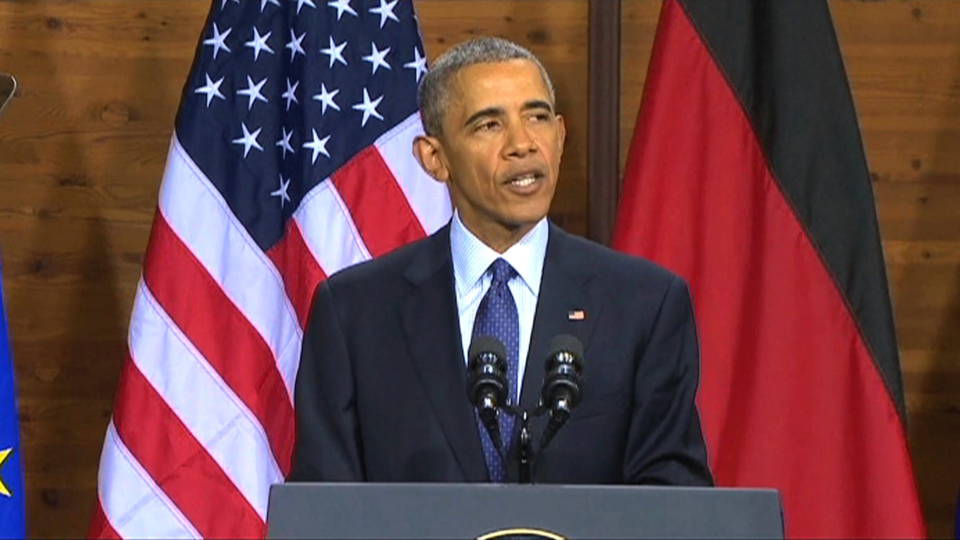
President Obama has announced the deployment of 250 more Special Operations troops to Syria in a move that nearly doubles the U.S. presence in the country. This comes just days after the Obama administration announced 217 more troops would be sent to Iraq to help in the fight against ISIS. President Obama addressed the wars in Syria and Iraq during a speech in Germany.
President Barack Obama: "We continue to make progress, pushingISIL back from territory that it controlled. And just as I’ve approved additional support for Iraqi forces against ISIL, I’ve decided to increase U.S. support for local forces fighting ISIL in Syria."
Germany: Up to 90,000 Protest TTIP U.S.-EU Trade Deal Ahead of Obama Visit
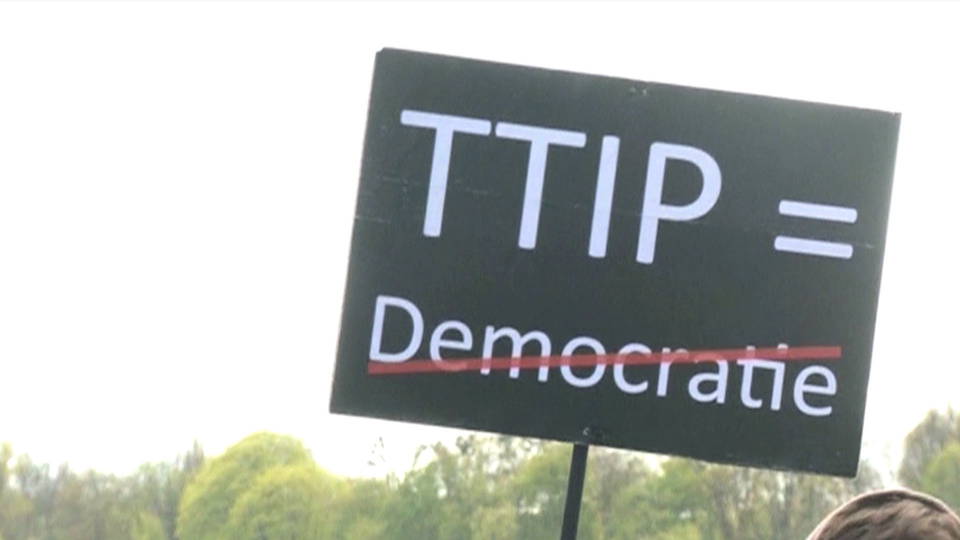
Ahead of Obama’s visit to Germany, tens of thousands of people took to the streets to protest a massive trade deal between the United States and European Union. Critics say the Transatlantic Trade and Investment Partnership, or TTIP, would undermine safety and environmental regulations to serve corporate interests. Organizers said 90,000 people attended the rally in the northern city of Hanover Saturday. Protests continued on Sunday.
Ivo Ivancic: "We should be part of the negotiations. They are creating a second judicial system, sitting in secret rooms with business delegates, deciding behind our backs. And putting governments under pressure with court cases worth billions of dollars because they claim they lose money, that is something which is not OK. And that’s why I am totally against TTIP."
Kasich, Cruz to Coordinate in Bid to Defeat Trump
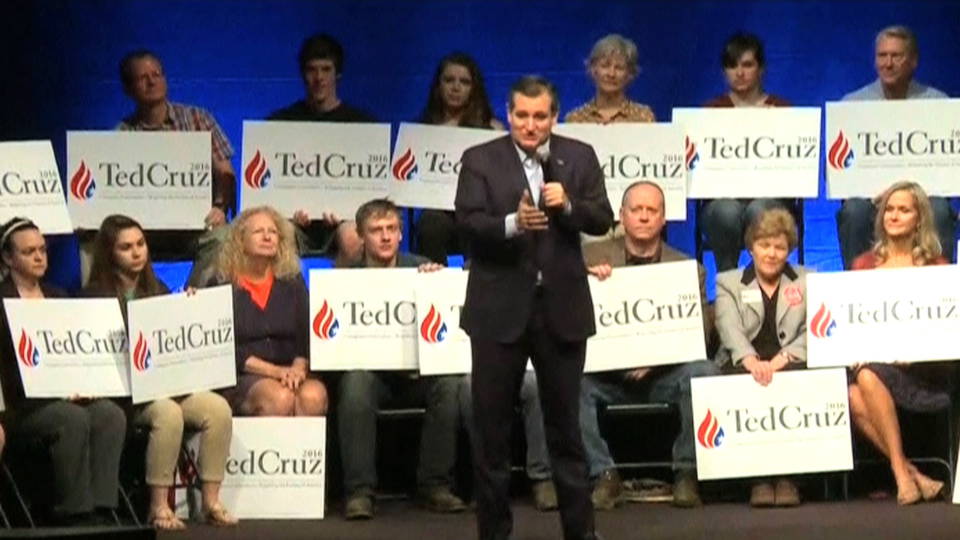
Ohio Governor John Kasich and Texas Senator Ted Cruz have announced plans to coordinate their campaigns in an effort to deny front-runner Donald Trump the Republican presidential nomination. Cruz’s campaign says it will focus on the May 3 primary in Indiana in order to allow Kasich to compete with Trump in Oregon and here in New Mexico. Both Kasich and Cruz are hoping to keep Trump from reaching the threshold of 1,237 delegates needed to secure the nomination before the July convention. If Trump stays below that threshold, it opens the possibility of a contested convention, where delegates could switch their votes away from the candidate chosen in their state’s primary or caucus after the initial convention ballot.
GOP Megadonor Charles Koch Suggests He Could Back Clinton
Republican megadonor Charles Koch has said he could support Democratic presidential candidate Hillary Clinton over a Republican nominee in November. In an interview with ABC News, Koch said he would only support Republican candidates Donald Trump or Ted Cruz if they change certain proposals, including Cruz’s vow to carpet-bomb ISIS and Trump’s plan to ban Muslims from entering the United States. Koch spoke to journalist Jonathan Karl.
Jonathan Karl: "Am I hearing you correctly: You think Bill Clinton was a better president than George W. Bush?"
Charles Koch: "Well, in some ways. In other ways, I mean, he wasn’t an exemplar."
Jonathan Karl: "Yeah."
Charles Koch: "But as far as the growth of government, the increase in spending, on restrictive regulations, it was two-and-a-half times under Bush than it was under Clinton."
Jonathan Karl: "So is it possible another Clinton could be better than another Republican—"
Charles Koch: "It’s possible."
Jonathan Karl: "—the next time around?"
Charles Koch: "It’s possible."
Jonathan Karl: "You couldn’t see yourself supporting Hillary Clinton, could you?"
Charles Koch: "Well, I—that—her—we would have to believe her actions would be quite different than her rhetoric. Let me put it that way."
Virginia Governor Restores Voting Rights to 200,000 Felons
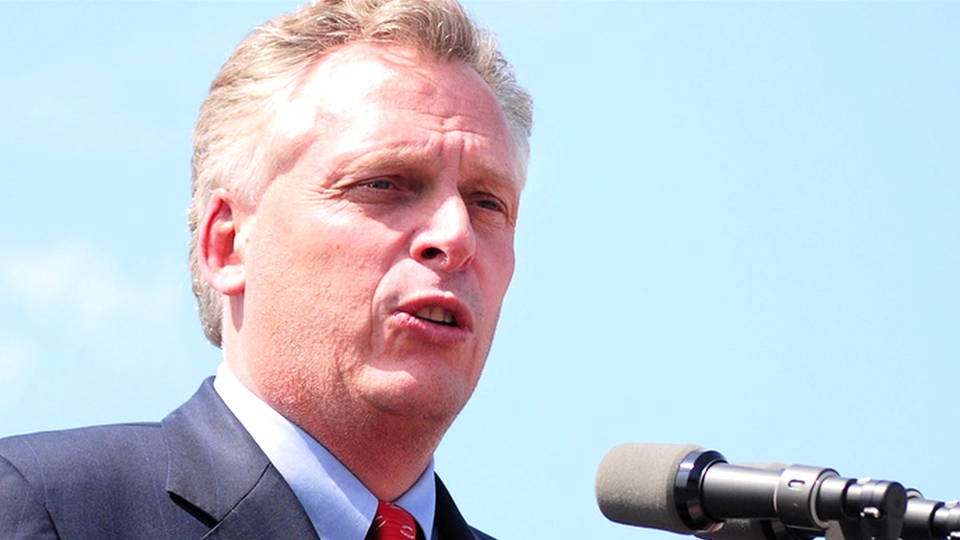
Virginia Democratic Governor Terry McAuliffe has restored voting rights to more than 200,000 felons. Bypassing the Republican Legislature, McAuliffe issued the change through executive order. It will allow felons who have served their prison time and finished parole or probation to register to vote in time for the November election. Virginia is a key swing state. Most of those affected are African-American.
8 Family Members Shot to Death in Ohio; 5 Killed in Georgia
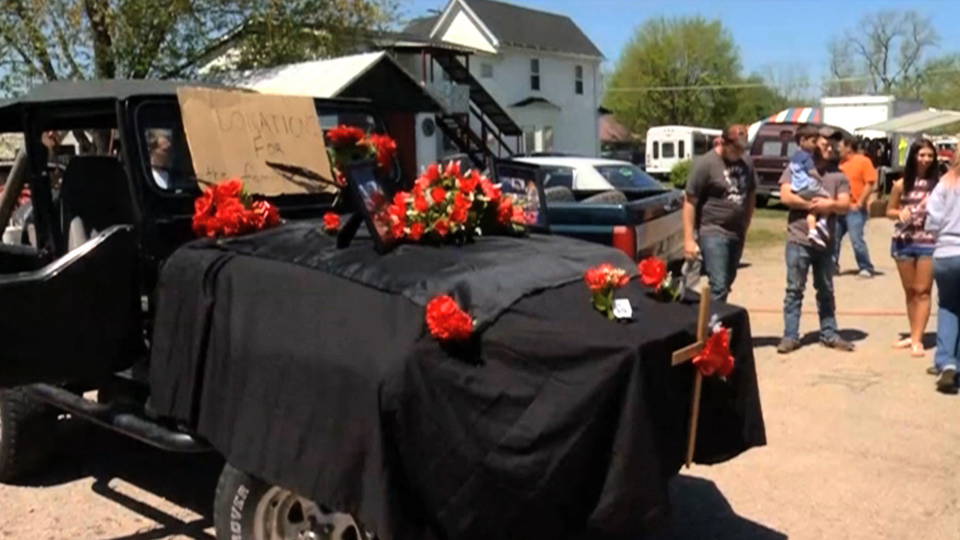
Eight members of a single family have been shot to death in rural Ohio. Authorities say seven adults and a 16-year-old, all members of the Rhoden family, were shot in the head, execution-style, most while they slept. They were killed early Friday at four crime scenes within a short distance of each other. Ohio Attorney General Mike DeWine said the shootings were not random.
Mike DeWine: "This was a preplanned execution of eight individuals. It was a sophisticated operation. And those who carried it out were trying to do everything that they could do to hinder the investigation and their prosecution."
Meanwhile in Georgia, a man is suspected of fatally shooting five people at two separate locations, then killing himself as part of what authorities described as a domestic dispute. Wayne Anthony Hawes reportedly killed a number of his wife’s relatives after she left him.
In Victory for CIA Torture Victims, Judge Lets Lawsuit Against Psychologists Advance
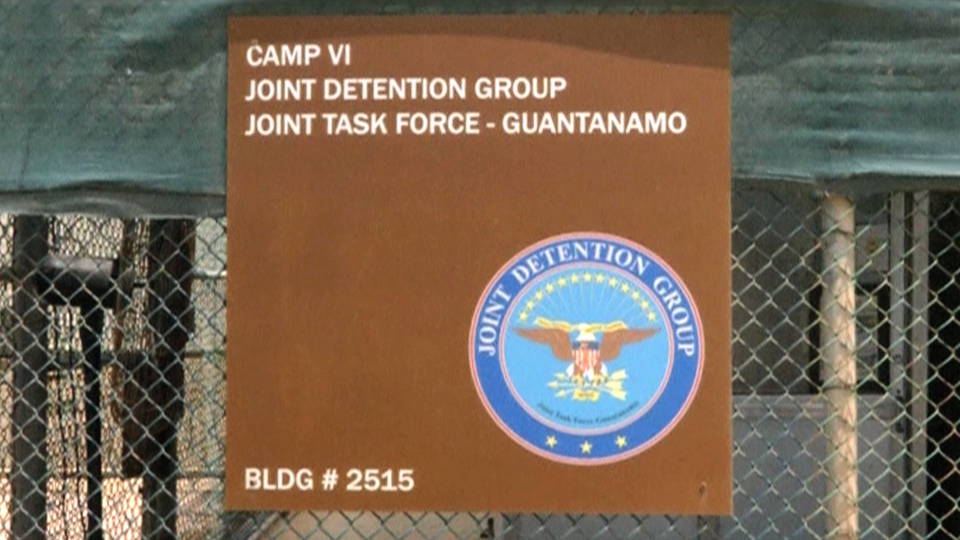
In a victory for survivors of CIA torture, a federal judge has allowed a lawsuit to move forward against the two psychologists who designed and implemented the program. Psychologists James Mitchell and Bruce Jessen reaped more than $80 million for designing torture techniques used by the CIA. The lawsuit was filed on behalf of two torture survivors and the family of a third man, Gul Rahman, who froze to death at aCIA black site in Afghanistan. ACLU staff attorney Dror Ladin called the judge’s decision "a historic win in the fight to hold the people responsible for torture accountable."
Saudi Human Rights Activist Sentenced to 9 Years in Prison
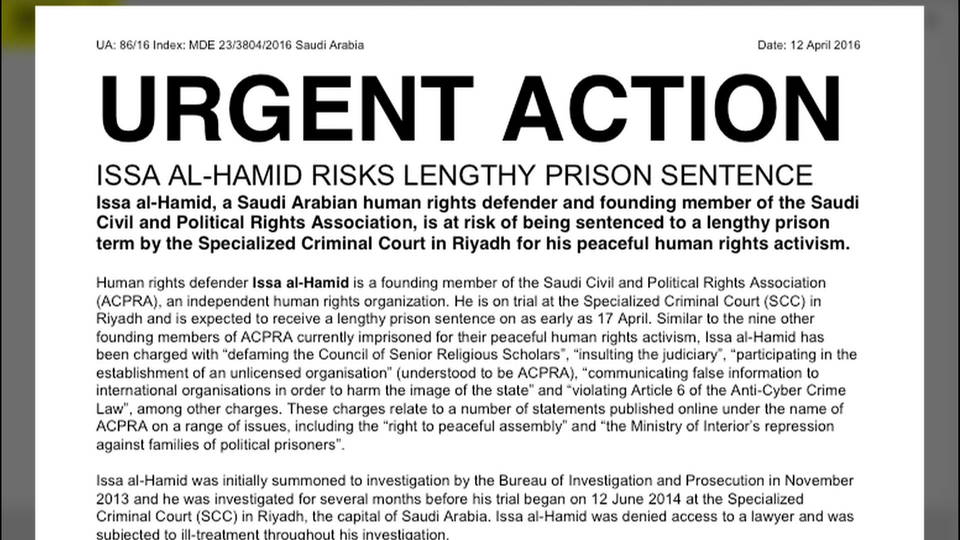
A court in Saudi Arabia has sentenced a human rights activist to nine years in prison. Amnesty International condemned the sentencing of Issa al-Hamid as part of the "Saudi Arabian authorities’ ruthless quest to eradicate any last vestige of dissent." Obama visited Saudi Arabia for a fourth time last week.
Nigerian Military Accused of Massacring Hundreds of People
Amnesty International has accused the Nigerian military of massacring hundreds of people, burning some alive, and trying to cover up the killings. More than 350 people are believed to have been unlawfully slaughtered by Nigerian soldiers in December during a confrontation between the military and demonstrators with the Islamic Movement of Nigeria.
Austria: Far-Right Candidate Tops 1st Round of Presidential Elections
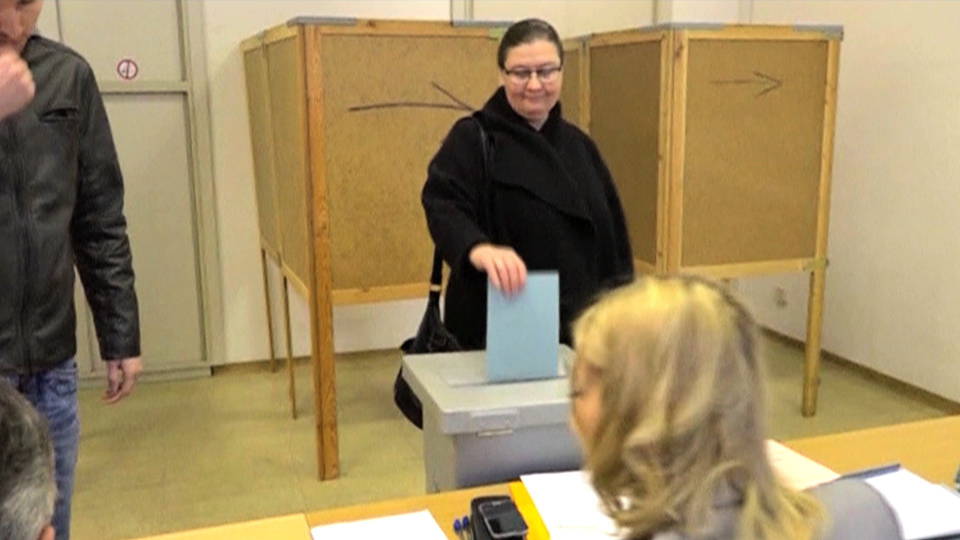
In Austria, a far-right candidate has won the first round of the presidential elections after running on an anti-immigrant campaign focusing on the arrival of refugees. It was the best result to date for the far-right Freedom Party in a national election. The party’s candidate will face a Green party-backed candidate in a runoff in May.
Expert Panel Accuses Mexican Gov't of Stonewalling Probe of 43 Missing Students
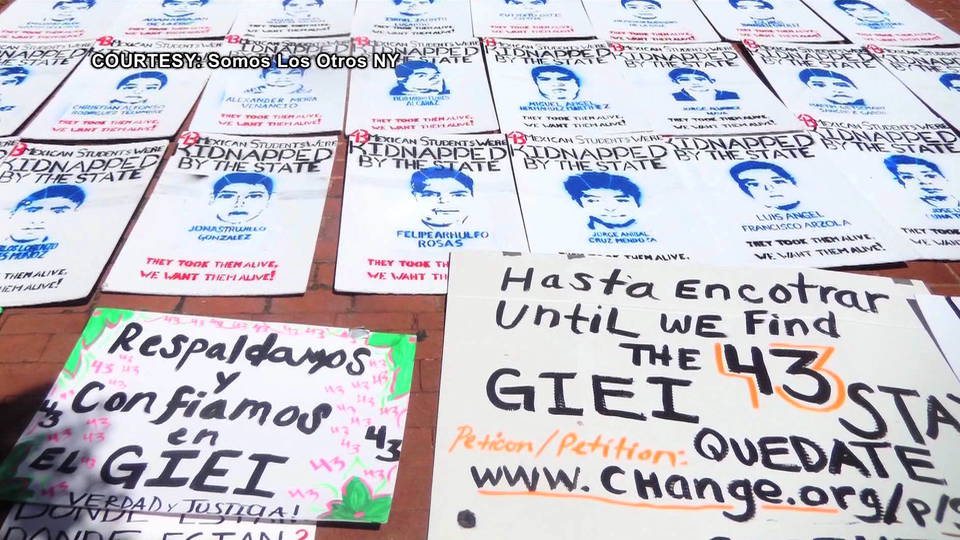
A group of independent experts have accused the Mexican government of stonewalling their investigation into the disappearance of 43 students in September 2014. Mexican authorities have claimed police turned the students over to drug gang members, who killed them and incinerated their bodies. But the experts, appointed by the Inter-American Commission on Human Rights, concluded there was no such burning. The experts also found evidence state, federal and military personnel were present on the night of the disappearance, and evidence that suspects whose confessions were used to bolster the government’s account were tortured. The experts said they faced obstacles from the Mexican government, including the withholding of documents and even a retaliatory criminal probe into one of the officials who appointed the panel. In Washington, D.C., Antonio Tizapa, the father of one of the missing students, joined a demonstration in support of the panel. He spoke to Democracy Now! by phone.
Antonio Tizapa: "It’s not a protest. It’s a major show of support for this great work that they have done. This is a way to show gratitude and express our support, so they continue, so they see we have confidence in them, because we don’t have confidence in the government."
Immigration Guard Could Serve Less Time for Sexual Assault Than His Victim Did in Detention

A guard at a private immigrant detention center in Pennsylvania will go to prison after admitting he sexually assaulted a 19-year-old Honduran woman. Daniel Sharkey is the first worker at a family detention center to be convicted of institutional sexual assault, despite previous reports of sexual abuse in such facilities. He has been sentenced to six to 23 months in prison; there is a chance he will serve less time than his victim and her three-year-old son spent in detention after fleeing abuse in Honduras.
Woman Who was Among 1st to Sue over Flint Water Crisis Shot Dead
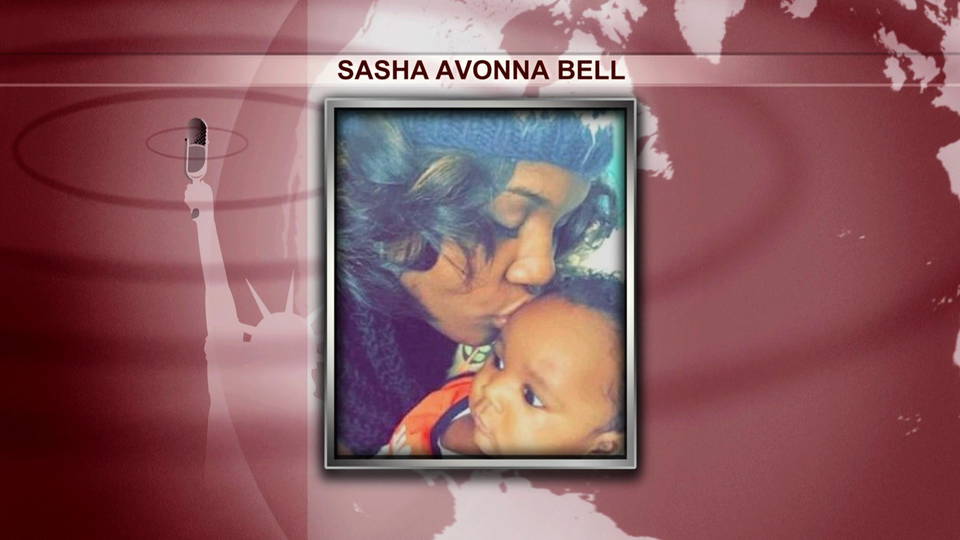
One of the first people to file a lawsuit in connection with the water poisoning crisis in Flint, Michigan, has been shot to death. Sasha Avonna Bell said her child had been poisoned with lead after an emergency manager appointed by Governor Rick Snyder switched the city’s water to the corrosive Flint River. Bell was one of two women found shot to death last week at a townhouse. She was 19 years old.
Family of Man Killed by Corrections Officers Stages 5-Day Hunger Strike
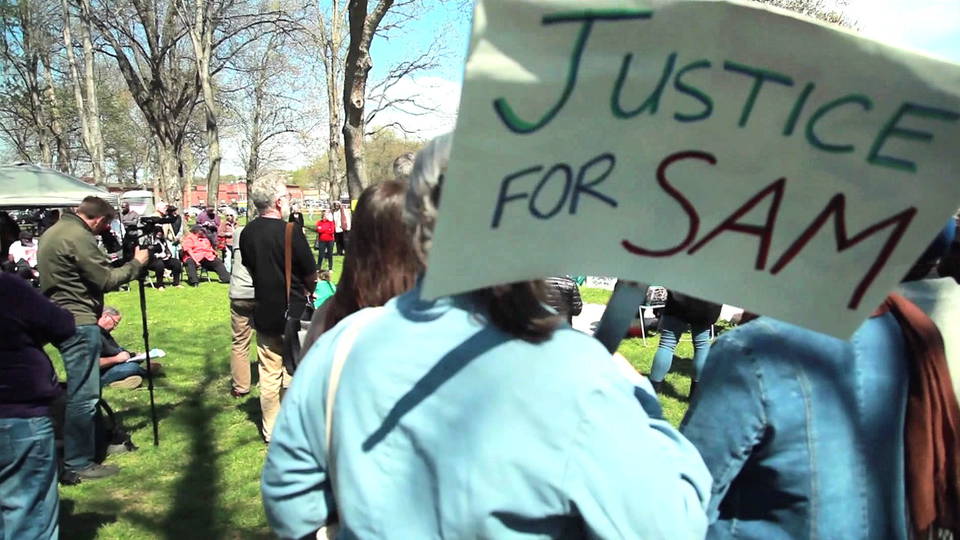
And family and friends of Samuel Harrell plan to conclude their five-day hunger strike at a rally in Harlem today after marking the first anniversary of Harrell’s death. Harrell was an African-American man who died after as many as 20 corrections officers kicked, punched and threw him down a flight of stairs while he was incarcerated at the Fishkill Correctional Facility in Beacon, New York. At a vigil near the prison, his sister, Cerissa, spoke out about why she and others are on hunger strike.
Cerissa Harrell: "The reason for the hunger strike is to give up—we’re willing to not eat, you know, to get something in return. And what we want in return is justice. It’s been a year. Nothing has happened. Does it hurt? It hurts a lot. Do I think about it? Every day. Do I forget about him? Never."
Samuel Harrell’s supporters have demanded reforms including body cameras for corrections officers. They say all the corrections officers involved in Harrell’s death remain on active duty.
Donate today:
Follow:




SPEAKING EVENTS

4/25 Albuquerque, NM
4/26 Los Alamos, NM
4/26 Santa Fe, NM
4/27 Flagstaff, AZ
4/28 Phoenix, AZ
4/28 Tucson, AZ
4/29 Fresno, CA
4/30 San Mateo, CA
4/30 Grass Valley, CA
5/1 Houston, TX
5/1 New Orleans, LA
5/2 Sarasota, FL
more
NEW BOOK
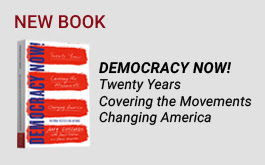
Democracy Now!: Twenty Years Covering the Movements Changing America
WEB EXCLUSIVE

Part 2: Seymour Hersh's New Book Disputes U.S. Account of Bin Laden Killing
WORK WITH DN!

Broadcast Engineer
Director of Finance and Operations
WEB EXCLUSIVE

VIDEO: Spoken Word Artist Saul Williams Extended Interview on His New Album,MartyrLoserKing
207 West 25th Street, 11th Floor
New York, New York 10001, United States
---------------------
---------------------
No comments:
Post a Comment